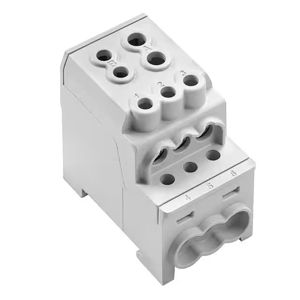
Terminal Blocks - Power Distribution
Terminal Blocks - Power Distribution
Definition:
Terminal blocks, specifically designed for power distribution, are modular, insulated connectors that enable secure and efficient electrical connections in various applications. These components serve as critical junction points for distributing power within electrical systems, ensuring reliable and organized wiring. They are widely used in industrial, commercial, and residential settings where robust power management is essential.
Types of Terminal Blocks in Power Distribution:
1. Barrier Terminal Blocks Feature screw-down clamps for secure wire termination, ideal for high-vibration environments.
2. Feed-Through Terminal Blocks Allow daisy-chaining of multiple connections, simplifying power distribution across circuits.
3. Fused Terminal Blocks Integrate fuse protection to safeguard against overcurrent, enhancing system safety.
4. Ground Terminal Blocks Provide dedicated grounding points to prevent electrical interference and ensure compliance with safety standards.
5. High-Current Terminal Blocks Engineered to handle elevated power loads, commonly used in heavy machinery and power supply units.
Purchasing Recommendations:
- Current & Voltage Ratings: Verify the terminal block s specifications to match your system s power requirements.
- Wire Compatibility: Ensure the block accommodates the gauge and type of wire (e.g., solid, stranded) used in your application.
- Environmental Conditions: Opt for corrosion-resistant or high-temperature models if deploying in harsh settings.
- Certifications: Look for UL, IEC, or other industry-standard approvals to guarantee reliability and compliance.
- Modularity vs. Fixed Designs: Modular blocks offer scalability, while fixed types provide stability for permanent installations.
By selecting the appropriate terminal block type and adhering to these guidelines, you can optimize power distribution efficiency, safety, and longevity in your electrical systems.

